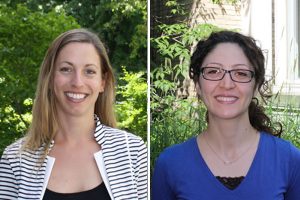
July 27, 2016 — Collaboration is the key to success of two new professors that are cross-appointed with the Departments of Mechanical and Industrial Engineering, and Civil Engineering. Professors Marianne Touchie (CivE, MIE) and Fae Azhari (MIE, CivE) joined the Faculty at the beginning of July.
Professor Touchie completed a BASc and PhD in Civil Engineering at the University of Toronto. Her research focuses on improving the energy performance and indoor environmental quality of existing buildings to make them more comfortable, healthy and sustainable through comprehensive retrofits.
Professor Azhari holds degrees in Civil Engineering from Isfahan University of Technology and University of British Columbia, Industrial Engineering from UC Berkeley, and Structural Engineering and Mechanics from UC Davis. She specializes in structural health monitoring of engineering systems.
U of T Engineering spoke with the new professors to find out more about their research and what they’re looking forward to at U of T:
Could you explain the focus of your research?
MT: My research focuses on the question of how we improve the quality of our indoor environment as we strive for greater energy efficiency. Making buildings more comfortable and healthy often comes at an energy cost.
FA: My work focuses on structural health monitoring (SHM) of engineering systems. Similar to the way a doctor would point out when an organ is malfunctioning in a patient’s body during regular check-ups, SHM is able to diagnose and locate any anomalies in an engineering system. Since this diagnosis happens at a very early stage, the remedial procedure will usually be timely and cost effective. My goal is to address some of the gaps in the succession of tasks from sensor development to implementation and decision making.
Why did you choose U of T?
MT: U of T is my alma mater so I am well aware of the significance and impact of the research done here and I am looking forward to collaborating with so many talented colleagues and students in both the lab and the classroom.
FA: Long before pursuing academia, I visited Toronto and the campus here. The historical feel and the intellectual vibe stayed in my mind. I’m so happy to be working here now. My research field is multidisciplinary, and having access to the many great resources, facilities, colleagues and mentors at U of T will be extremely valuable in advancing my research and career.
What are you most looking forward to in your new position?
MT: With a cross appointment between Civil Engineering and Mechanical and Industrial Engineering, I’m excited to bring together students from across disciplines.
FA: I like the sense of collegiality at U of T and look forward to effective collaborations with other researchers.
As a new professor, what one piece of advice would you give to new students?
MT: Allow yourself to wrestle with a problem before asking for help. It is effortless to use Google or message someone to find an answer. But this process doesn’t improve your own ability to problem solve, think critically or take your own position on an issue. During your time at U of T you will gain plenty of technical knowledge but transferable skills like problem solving will be of the most valuable after graduation.
FA: At university you are often your own teacher so expect to be treated that way. Try to be proactive and do not be afraid to ask questions.
What do you hope to accomplish in your new position/during your time at U of T Engineering?
MT: Within Civil Engineering, I would like to continue growing the Canadian Centre for Building Excellence (CCBE) with Professors Kim Pressnail and Jeffrey Siegel into a world-renowned research centre for healthy, energy efficient buildings. I would also like to create stronger links through multidisciplinary design courses which will give students an opportunity to tackle today’s important problems with colleagues from a variety of technical backgrounds.
FA: I hope to one day truly ‘profess’ my subject.; to understand the old and new bodies of knowledge in such a way that I can properly judge their significance and place in the grand scheme of things.